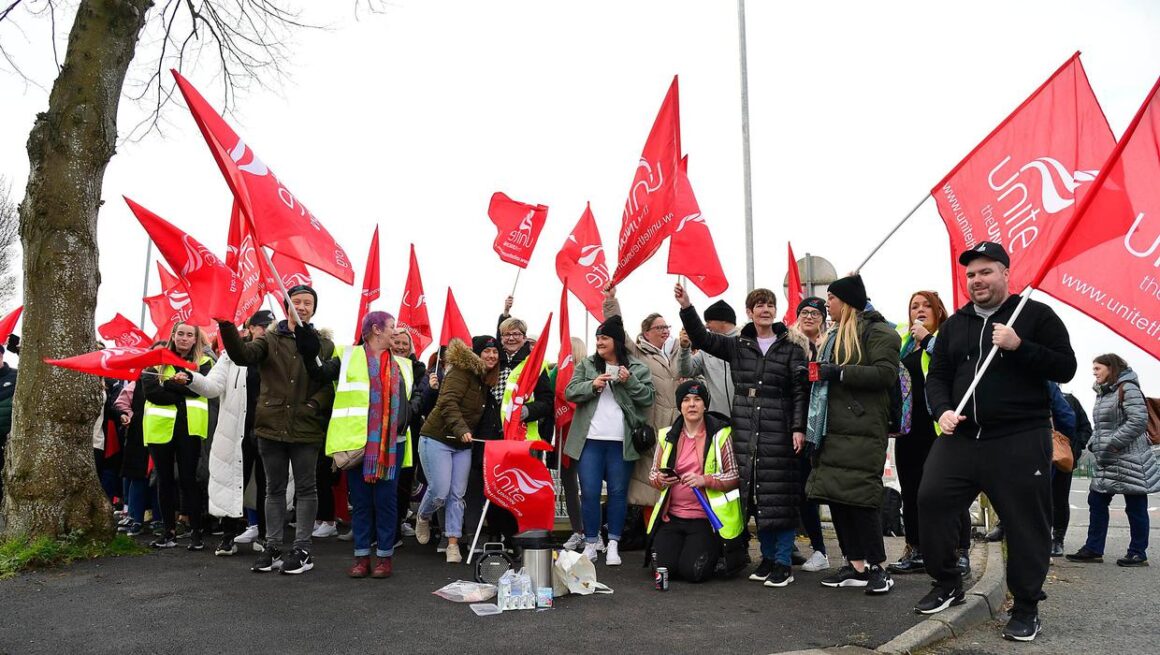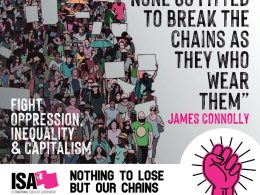Editorial from the Socialist, paper of the Socialist Party in the North
“SPRINGTIME OF DISCONTENT” was the headline carried by the Belfast Newsletter on 1 April 2022. An apt description of the current wave of industrial unrest and a warning to the employers in Northern Ireland that workers will not sit idly by while their living standards are eroded by inflation. In a short couple of months 1000s of workers many of whom have participated in strikes, ballots and other forms of industrial action. There is an opportunity now, for this momentum to be built upon and serious gains won for ordinary people.
Cost of living crisis fuelling struggle
The cost of living crisis is spiraling out of control. Inflation has continued to eat into the pockets of ordinary people as the profits of big business continue to hold strong. Nearly a third of people here would struggle to afford an unexpected bill of just £300, according to a survey by consumer publication “Which?”. Vehicle fuel prices also remain high. The same survey reported close to one in ten people skipping meals. Increasingly the choice is between heating and eating.
This crisis is the backdrop of the current wave of industrial militancy. During lockdown workers were applauded as “essential” only to now be offered below-inflation pay offers particularly while costs rise, we are now refusing to accept only the bare minimum.
Growing militancy
Across both the private and public sectors there has been a series of strong ballots. With high turnouts in favor of industrial action or a rejection of derisory pay offers. In February an amalgam of five teaching unions rejected a pay deal of 3.2% over two years. 11 Local Authorities (including binmen and leisure center staff) went on strike earlier in March, alongside Housing Executive workers (such as repairmen), after rejecting a 1.75% offer. A ballot involving about 1,400 Unite staff and 500 GMB workers in Translink has rejected a 3% pay rise with strike action planned. Additionally Nurses in the RCN overwhelmingly (by 92%) rejected a 3% pay offer with health unions hinting at industrial action in the autumn. Education Welfare Officers are also continuing their action. Across the North nearly half a dozen major workplaces are engaging in ballots and/or industrial action.
Many of these pay offers were acceptable in years gone by but this is no longer the case. Workers have hit their limit to how much they can be squeezed. Strong turnouts with high votes in favor indicate that workers are prepared to fight for fair pay.
The militant action of workers at Glen Dimplex stands as an example of how effective such action is. Unite members there managed to win a hugely significant 13.5% pay increase. This was only secured after workers launched three days of strike action aimed at having the biggest impact on production and the profits of the site’s multi-millionaire owner. This, together with a plan to escalate their action into continuous strike action shows that with resolve, organising a stronger union and a willingness to take militant industrial action, significant victories can be achieved by workers.
Co-ordinate the action
There is an opportunity opening up to present a significant challenge to the status quo. As we are in the midst of an election that is highly polarised along sectarian lines, workers from all backgrounds and creeds are standing shoulder to shoulder on the picket line in opposition to the employers and the assembly’s policies. Now is the time to bring together the various disputes into a unified struggle. Timing ballots to coincide with one and other particularly in the public sector will bring to bear tremendous pressure that will result in significant pay rises.
Campaign of sustained action needed
We cannot afford to simply leave it after one year of action to find ourselves out again in a year’s time fighting for pay once again. Inflation is likely to continue to rise and Capitalism on a global scale is hurtling into an economic crisis larger than 07/08. Already a General Strike has been called in Greece. Industrial action on this scale has not been announced there in years. It is an indicator that workers will not take it any longer. Workers here need to follow their example.
The trade union movement should build on this momentum and organise a serious, coordinated campaign of industrial action on pay, and more broadly to tackle the squeeze on living standards. As well as uniting the struggles already underway, we need mass demonstrations on the cost of living. The Irish Congress of Trade Unions, or those unions willing to do so, should call such protests on 18th June, to coincide with demonstrations already being organised in Britain. This could build confidence for days of widespread strike action across the public and private sectors, seeking to involve as many workers as possible. Moves in this direction would not only challenge the employers but also shake the entire status quo in the North, as workers stand united in their common class interest.












